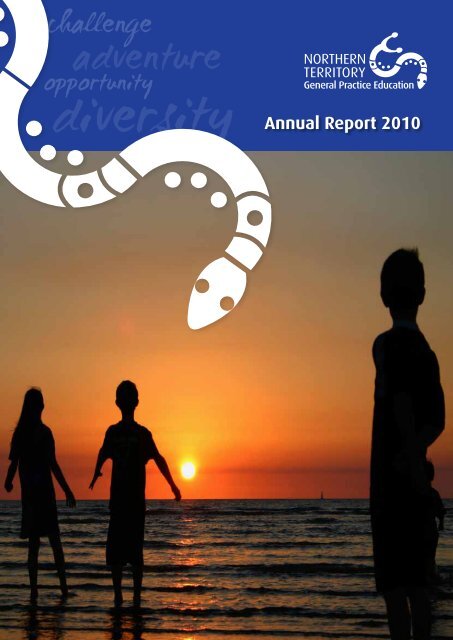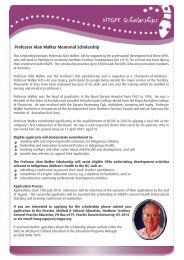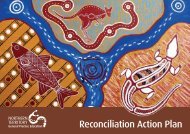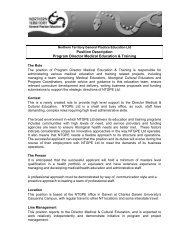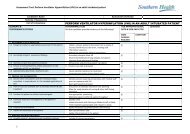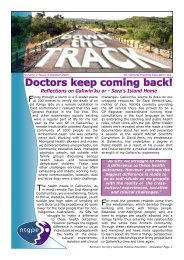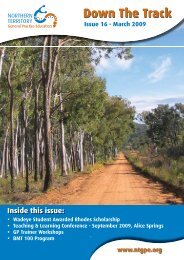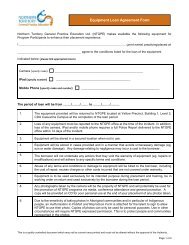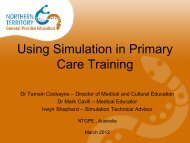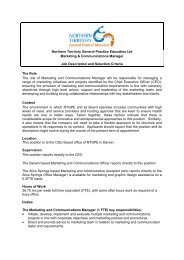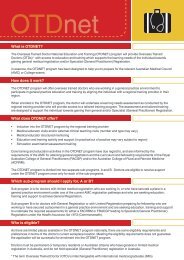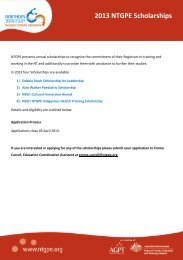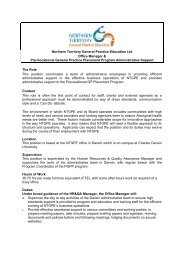Annual Report - ntgpe
Annual Report - ntgpe
Annual Report - ntgpe
Create successful ePaper yourself
Turn your PDF publications into a flip-book with our unique Google optimized e-Paper software.
Vision & MissionVisionNTGPE is the innovative provider of quality generalpractice training and an active collaborator in theprovision of superior medical education in Australia’sNorthern Territory.We are the key contributor to leadership in national andinternational models for general medical education,especially for remote and Aboriginal communities.MissionNTGPE’s role is to educate and train medical practitionersto become broadly experienced, competent, culturallyaware, and self-reliant, who are capable of providingquality service nationally, and who have particularcapabilities for supporting the Northern Territory’s urban,rural, and remote communities with particular focus onAboriginal health.We are ethical and socially just in our activities, andprovide a flexible, supportive and culturally awarelearning environment.2 Northern Territory General Practice Education
About UsNorthern Territory General Practice Education Limited(NTGPE) is the major provider of General PracticeEducation and Training in Australia’s NorthernTerritory. NTGPE’s principal role is the provision of avertically integrated medical vocational experiencefor undergraduates, prevocational and vocationalpostgraduates, as well as continuing medicaleducation for independent general practitioners,international medical graduates and primary healthcare workers throughout the NT.Since 2002, NTGPE has seen a significant increase of itswork in its intention to become a Centre of Excellencefor Aboriginal health and a regional training providerfor general practice registrars (GPRs), junior doctors,international medical graduates and medical students.NTGPE has administrative centres in Darwin and AliceSprings and its work is conducted through a networkof medical and Aboriginal cultural educators and otherstaff dispersed across the NT. This enables a betterresponse to the needs of students, GPRs, junior doctorsand medical practitioners in communities where theyare working and/or training.“...NTGPE is the major provider ofGeneral Practice Education andTraining in Australia’s NorthernTerritory...”NTGPE was established in its present form in 2001by a consortium of key organisations from a proudheritage of the former General Practice Education &Research Unit (GPERU) established in 1997. That unithad evolved from the RACGP’s Regional NT officewho commenced GP training in the Northern Territoryin 1993 and provided formal Top End placementprograms for medical students from Australianuniversities in 1995.The Darwin office is based at Charles DarwinUniversity’s Casuarina Campus. The Alice Springsoffice is co-located with General Practice & PrimaryHealth Care NT and the Central Australian Division ofPrimary Health Care, which have subsequently mergedwith the Top End Division of General Practice to formGeneral Practice Network NT (GPNNT).NTGPE aims to deliver a unique education and trainingexperience in Aboriginal health through an extensivenetwork of diverse rural and remote communities,hospitals, clinics and Aboriginal community controlledhealth services.NTGPE gratefully acknowledges the financial supportof its stakeholders, including agencies reflected byits Board of Directors and the Australian GovernmentDepartment of Health & Ageing (DOHA) and the NTDepartment of Health & Families (DHF).<strong>Annual</strong> <strong>Report</strong> 2010 33
The BoardThe BoardThe NTGPE Board of Directors comprises all keycontributors to effective general practice and primaryhealth care education and training programs in and forthe Northern Territory. Please meet:Dr Samuel HeardDirector & Chair of BoardIndependent Chair(Appointed April 2006)Dr Michael WilsonExecutive DirectorNorthern TerritoryGeneral Practice Education Ltd(Appointed April 2006)Dr Andrew BellMember & DirectorAustralian College ofRural and Remote Medicine(Appointed November 2007)Ms Margaret BrownDirectorHealth Consumers ofRural and Remote Australia Inc(Appointed June 2004)Dr Jo WrightDirectorDepartment of Health & Families(Appointed May 2010)Dr Nigel GrayDirectorTrainer Liaison Officer(Appointed June 2004)Dr Emma KennedyMember & DirectorRoyal Australian Collegeof General Practice(Appointed August 2006)Mr John PatersonMember & DirectorAboriginal Medical ServicesAlliance of the Northern Territory(Appointed November 2006)Professor Richard ReedMember, Director,Public Officer & Deputy ChairFlinders University(Appointed February 2006)Professor Charles WebbMember & DirectorCharles Darwin University(Appointed February 2002)Professor Michael KiddMember & DirectorExecutive DeanFaculty of Health SciencesFlinders University(Appointed October 2009)<strong>Annual</strong> <strong>Report</strong> 2010 5
<strong>Report</strong> from the Chairperson of the BoardNTGPE has had another good year with a strong teamdelivering good results. Dr Hung The Nguyen hasmoved to Melbourne but has agreed to continue to leadthe Education team. I am personally extremely gratefulto Hung for his commitment to the Northern Territoryand the academic leadership he has and continues toprovide during this period of growth and broader focus.His national profile in Aboriginal Health and educationalsupport for international medical graduates puts him ina special category of Australian doctors.During 2010, NTGPE hosted and helped organise thesuccessful GPET convention in Alice Springs which waswell attended. I had the pleasure of seeing many of theNTGPE team in action and was particularly impressedwith Kevin Parriman and Richard Fejo in leading adiscussion on cultural education titled “Lotus and pearls– bringing culture to GP education”. This reflects theincreasingly important role of the Cultural Educationteam in health care and throughout government inthe NT. Tamsin Cockayne’s poem capturing a youngpregnant woman’s and her GP’s experience of theintervention had a large audience in tears – rescuedby Richard Hosking’s humble and extraordinary storiesof working in Port Keats. These two presentations putNTGPE in very good light. After an impromptu ‘Henley onTodd’, which nearly caused our team serious damage,our very own band, Simon and the GPettes, brought thecrowd to their feet at the wonderful outside dinner atthe Telegraph station.NTGPE is leading a move to a more responsible andautonomous RTP approach, working with both Collegesto manage accreditation, develop new relevant modelsof supervision, and attract more resources for studentsand registrars to the NT. Thirteen registrars graduatedwith the FRACGP in 2010. Further, more registrars areseeking joint Fellowships from ACRRM and the RACGP.The number of PGPPP places has increased greatly butwe still have problems with freeing up young doctorsfrom the understaffed RDH. Over 70% of our juniordoctors go on to join GP training throughout Australia.Infrastructure support is expanding with the additionof 3 houses in remote communities bringing the list ofmanaged dwellings to thirty three.The focus for 2011 will be on developing the trainingresources of practices and the experience for registrars.Collaboration with other providers is essential to ensurethat the NT can deliver on the challenges of the newmedical school and increased PGPPP placements inan environment where there is a shortage of doctors.Flinders, CDU and NTGPE can make a real difference ifthe level of collaboration is deep and uncompromising.Trust is a necessary precursor and the Board willbe doing everything to try to generate a positiveenvironment for change.This year we will see members of the national GPETBoard undergoing cultural immersion training ledby Ada Parry and attracting CPD points for the GPmembers. I hope this will further add to our kudosand strengthen our reputation as an education centreof national importance. It will be an exciting year aswe begin to form relationships with the new MedicalSchool and revitalise our committed supervisorsand other GP practice members to participate in theextraordinarily rewarding work of training and retainingyoung doctors in the NT. Our community depends on usbeing successful.Dr Samuel HeardIndependent ChairpersonNTGPE Board6 Northern Territory General Practice Education
Executive Director’s <strong>Report</strong>appears to be a lack of understanding of how criticaland long overdue dedicated housing funding for healthcare professionals in training within the NT is if trainingand workforce objectives are to be achieved. Socialand professional isolation of health care professionalsin training remains significant. Strategies aimed atreducing this are often expensive or rely heavily onrobust IT infrastructure and broadband speed. In anattempt to address these matters NTGPE has beenproactive in seeking funding and submission of proposalsin an attempt to increase doctors in training access toe-learning resources, improve social networking andprovide assisted travel from remote communities.NTGPE continues to achieve vertical integrationacross the continuum of general practice training.147 Medical Students, 77 Junior Doctors (JD) and 73General Practice Registrars (GPR) were placed in 2010throughout the NT predominantly in RA4 and 5 areas.The Rural Undergraduate Support and CoordinationProgram (RUSC) contract expires on 30 June 2011 andthis may witness the end of truly vertically integratedmodel of training in the NT. It is anticipated that NTGPEwill continue to place John Flynn Scholarship studentsand offer undergraduate placements for universities ona cost neutral basis in 2011 and beyond. It is criticalthat medical students from all jurisdictions have theopportunity to experience general practice and primaryhealth care training in this wonderful albeit challengingenvironment. The commencement of the NT medicalprogram in early 2011 should start to see a flow ofhome grown graduates taking up general practicetraining in the NT from 2017 onwards. Neverthelessthere is anticipated a significant shortfall of the numberof graduates required to commence training in GeneralPractice in the NT to ensure a sustainable workforce.NTGPE successfully piloted GPET’s new IndigenousHealth Training salary pilot in 2010. Implementationof the scheme involved numerous site visits andfollow up visits by Ms Norma Benger, GPET Stateaffiliate Officer, AMSANT and I. The importance ofthe affiliate officer working closely with the local RTPcannot be understated. We still face major challengesparticularly in the areas of supervision and provision ofaccommodation in remote settings. Numerous housingrelated funding submissions have been tendered andextensive lobbying has occurred. However there stillAn area of significant importance in GP training iscultural education and ongoing mentoring in thecommunities. NTGPE offers four tiers of culturaleducation training for health care professionals. Thecultural immersion camp under the leadership of MsAda Parry and her family attracts CPD points as well asoffering a learning experience that in some instances isprofound for participants.“It is critical that medical studentsfrom all jurisdictions have theopportunity to experience generalpractice and primary health caretraining in this wonderful albeitchallenging environment.”NTGPE in collaboration with AMSANT have beenadvocating for several years the desperate need toformally recognise cultural education and mentorshipas a legitimate activity. It requires appropriate fundingto ensure that the learning experience of doctorsin training is culturally safe, well supported and anenticement for them to return to work as GPs in remoteaboriginal communities. Until this important part ofthe equation is specifically funded and supported byformalised cultural mentored training and employmentfor local aboriginal people, the ability to attract doctorsto work in remote aboriginal communities will becompromised. The third major component for the<strong>Annual</strong> <strong>Annual</strong> <strong>Report</strong> <strong>Report</strong> 2010 2010 7 7
Executive Director’s <strong>Report</strong>success of our programs is the ongoing support ofour General Practitioners, Aboriginal health Workersand nurse supervisors. Without their goodwill andwillingness to provide both professional and personalsupport to our program participants NTGPE would notbe able to offer the programs that it does in a safe andsupportive learning environment. The GP supervisorroad shows conducted throughout the NT have beenan overwhelming success in supporting supervisorswho are themselves often professionally and sociallyisolated.The increase in GPR training, PGPPP and Undergraduatemedical training places by the Australian Governmentis most welcome. It does however reinforce theimportance of effective coordination of trainingplacements and cooperation across the system. NTGPEhave a strong history in fulfilling this role within the NT.NTGPE’s Board is comprised of the majority of the majorstakeholders in health professional training in the NT.The solution is inclusive consultation and collaborationnot competition and fragmentation.The key to providing a balanced and comprehensivetraining is seen to be in bringing the combined skillsand expertise of all of the GPs in the region togetherin a single ’training precinct’ where components of theprimary and advanced curricula can be delivered by GPswith the appropriate skills, and supplemented by localand visiting specialists and other health professionals.This concept has been supported in principle by arepresentative meeting of local GPs Hospital doctorsand specialists. A presentation on the precinct conceptwas delivered at the Rural Medicine Australia (ACRRMand RDAA) Conference in Hobart in November, and wasregarded as being a useful and workable model byACRRM educational experts. The concept has not yetbeen endorsed by the NTGPE Board.The Katherine Centre of Excellence in Health Knowledge/ Education Hub is a community based project whichhas been pursued for the last 10 years, and AssocProf McConnel has been involved throughout thattime. The development of an Educational Hub wasa key component in the HWA submission preparedby Flinders Rural Clinical School, with NTGPE as oneNTGPE Professional Development Day 20108 Northern Territory General Practice Education
of the collaborating organisations. This submissionrelated to developments for teaching and learning inKatherine and Region. A scoping study for the Centreof Excellence has been funded by NT Dept of Healthand Families and Flinders University, and auspiced bythe Centre for Remote Health. NTGPE is a major partnerto the Centre of Excellence concept. The convergenceof these activities led to a conference convened bythe Centre of Excellence in November – ‘Capturing theChance’ – which was attended by all the institutions andorganisations involved in health professional educationin (or for) Katherine, including NTGPE.In remote aboriginal communities there is a wellrecognized critical shortage of accommodation formembers of the community. The flow on effect isthat availability of accommodation for health careprofessionals in training is often severely limited or inmany instances non-existent. In areas where miningactivities are taking place the demand for availableaccommodation is compounded by prohibitivelyexpensive rent. NTGPE is not eligible for funding undercurrent Government funding schemes as there is notspecific funding for the provision of accommodation,repairs and maintenance for vocational training posts.In order to meet contractual requirements specificallyin the area of increasing indigenous health trainingcapacity it is imperative that the stock of accommodationbe significantly increased, as a matter of urgency.international program.David Sweet of Cridlands MB Lawyers provided guidanceand advice to the Board, through a robust discussion atthe Risk Management Workshop. Risks were identifiedand mitigation measures recommended.NTGPE invited stakeholders to a workshop to discusshow the current health reforms may impact GeneralPractice Registrar training particularly in the CentralAustralian region.Mr Glen Wallace (Marketing & Corporate ServicesManager) accepted a position at Bendigo Health inlate 2010. Glen was a long standing member of staffand a member of the executive team since 2007.His contributions to NTGPE were vast ranging fromoffice management in Central Australia, marketing,desktop publishing, key stakeholder relationships andcoordination of the RUSC program. Glen’s input will bemissed. I wish him every success in his new position.I would also like to take this opportunity to thank theBoard, staff and key stakeholders for their ongoingsupport, dedication and guidance.Dr. Michael WilsonExecutive DirectorFunding is essential to the achievement of Governmentinitiatives in Aboriginal health. The ability to attractprivate investment in housing is restricted due tothe difficulty in securing land and uncertainty aroundconstruction timeframes.In September we established on a six month trial basisthe position of Chief Operations Officer. The position isresponsible for directing and managing the operationalactivities of the organisation and providing high levelsupport to the Executive Director. Mr. Peter Thompsonhas undertaken the role which will be subject toevaluation and report to the Board in February 2011.At the Strategic Planning Meeting in October the Boarddiscussed and decided that the main priorities of NTGPEwere logistics (housing/travel/placements), remotearea indigenous health training, the multidisciplinaryapproach and recruitment strategy including an<strong>Annual</strong> <strong>Report</strong> 2010 9
<strong>Report</strong> from Director Medical and Cultural Education3. Diversity of knowledge - if all the interactions areamong the usual suspects, then you end up with“group think” or “Bird of a Feather Syndrome”. Whenwrestling with complex issues we should bring togetherindividuals with a wide range of backgrounds and skills.A “healthy dose of randomness” can also be a plus.As I reflect on another busy year in 2010 and focusingnot so much on what we have achieved but how I recalla book I came across recently about decision makingin groups called “The Smart Swarm” by Peter Miller.In it, Miller provides a fascinating overview of howvarious types of animals – ants, honeybees, termites,and sparrows – tackle complex problems by leveragingcollective “intelligence” and how we as humans maylearn from group decision-making processes.There are 3 principles that stand out:1. Self-organization – where there is de-centralizeddecision making and where individual members ofa group have to be free to make their own decisionswithin a relatively sparse set of restrictions imposed bythe community or group.2. In-direct collaboration - No single individual hasthe answer. Each member of the group contributes abit towards creating a solution, just as many differentwriters and editors may contribute to a single Wikipediaentry. For distributed problem solving to work, therehave to be opportunities for individuals to interactfrequently and in a variety of different ways. Repeatedinteractions help to “amplify faint but important signalsand speed up decision making”. To work independentlyyet collectively toward a common end is in contrast towhat we are used to - working directly together tomake hard choices. The wonder is not that we face somany problems, but that we have somehow solved somany together in spite of a disperse team.I see many instances of these principles reflected inwhat we do in our education team, our interactions witheach other and external stakeholders and our attitudesto making choices in a complex teaching and learningenvironment and in making good decisions for ourNT context; decisions that will enhance collaboration,sustainable programs and building educational capacityin the NT. We have introduced a number of tools tocollaborate amongst a diverse and dispersed workforce.In 2010 we continue to value diversity in the workplace.One highlight in professional development was theCultural Competence Training. The daylong programreally made us think about how we interact withcolleagues from different cultures in our workplace andour learners who are placed within our programs.Our cultural education program continues to grow incore programs – RUSC, PGPPP, GPR – as well as externaldelivery of cultural orientation to RAHC and the NTPublic Service Cultural Competency workshops. NTGPEconducted its third annual week long Aboriginal culturalimmersion camp for health and education professionalsat Woodycupildlya, the country of one of NTGPE’sAboriginal Cultural Educators. Our Aboriginal CulturalEducators based in Darwin (Ada Parry, Kevin Parriman& Richie Fejo) and Alice Springs (Ken Lechleitner) arekept very busy through their contribution to a range ofprograms and continue to enhance NTGPE’s reputationof excellence in cultural education.The GPET conference held in Alice Springs in 2010under the theme of “Clinical and Cultural Competence- Everybody’s Business,” highlighted to all healthprofessionals the need to consider and integrate culturalissues with clinical skills for professionals to be clinicallyeffective in cultural diverse communities. Of course thefocus was on Aboriginal health as well and we had avery good presence at the convention program - bothsocial and academic.10 Northern Territory General Practice Education
This year saw the fruition of a collaborative venturebetween NTGPE, UniSA and ANU in piloting theplacement of 6 students at Danila Dilba in an Inter-Professional Learning (IPL) team. The team consistedof medical, physiotherapy, pharmacy and occupationaltherapy students. These students completed a projecttogether, met weekly with an IPL tutor and weresupervised by a health professional in their field ofstudy. Interestingly, the best rating learning wasfrom each other in a social environment at the NTGPEstudent accommodation (the hidden curriculum at play– a common observation in the NT context). We areplanning to have a limited number of IPL groups againin 2011.NTGPE has placed resources in Katherine to develop theregion as a viable education and training hub. AssocProf Fred McConnel has been working in Katherineon expanding opportunities for training towards theFACRRM. Despite the remote nature of the NorthernTerritory’s health facilities and services, practices differconsiderably from the standard rural and remote trainingposts in other states, and the scope and organisation ofpractices requires specific considerations for teachingthe ACRRM curriculum. However, almost all practicesin the Katherine region are now accredited for ACRRMtraining.Fred McConnell is continuing his work in developing andconsulting with the community and health professionalsin and around Katherine. The key to providing a balancedand comprehensive training is seen to be in bringingthe combined skills and expertise of all of the GPs inthe region together in a single ’training precinct’ wherecomponents of the primary and advanced curricula canbe delivered by GPs with the appropriate skills, andsupplemented by local and visiting specialists and otherhealth professionals. This concept has been supportedin principle by a representative meeting of local GPsHospital doctors and specialists. Further, the educationteam ran the first GPR conference in Katherine topromote Katherine to the GPRs cohort as a great placeto train and live.We are grateful for everybody’s time, expertise andeffort in making the event a great success and a lot offun. Certainly the Katherine Gorge dinner cruise was anevent highlight.The PGPPP program continues to grow and a greatamount of effort has gone into reviewing the programseducation delivery and curriculum. The curriculumintegration with the GPR program and building on itsstrengths in formative assessment towards generalpractice and rural medical practice are our main focus.This year also sees an increase in John Flynn Scholarsplaced in the NT through our student placement program.The IPL team of medical and allied health students isalso managed through the student placement program.Although we did reach our full quota of GPRs, we hada great number of GPRs transferring into the GPRprogram for rural and Indigenous health experience. Asignificant number of these transfers were or change topermanent transfers. This is a trend that NTGPE will tryto capitalize on.The cohort of GPR training in the NT is changing withmore International Medical Graduates and exclusiverural pathway GPR applicants as a result of the changein Remote Area classification taking effect in 2010.This trend is welcomed and will present its ownopportunities and challenges for the program in thecoming years.I would like to especially congratulate Kishan Pandithagefor being honored as the NT Educator of the Year at thepre-vocation education forum, November 2010. Kishanhas been a passionate educator and supporter in thePGPPP program and it is fitting for the NT to honor himin this way.Well done to all the Aboriginal cultural educators andmedical educators for their achievements this year andtheir hard work in increasing NTGPE’s presence in theNT and interstate through its activities at conferencesand other forums.Local GP Trainers from the health services in Katherinedelivered most of the sessions. Even the visitingPalliative Care team from Darwin came down to assist ina session. It truly shows up the commitment, expertiseand capacity for education and training in Katherine.<strong>Annual</strong> <strong>Report</strong> 2010 11
<strong>Report</strong> from Director Medical and Cultural EducationMedical EducatorsThe team has remained stable and also grown overthe past year continuing to build on strengths andcontributing to the development and delivery ofmedical education offered by NTGPE.The following educators contributed to the NTGPEmedical education program during the year and in theperiod up to the writing of this report:Alice SpringsDr. Christine LesnikowskiDr. Zizi SaudieDr. Jessica KneeboneDr. Kate LloydDr. Jenny MayKatherineDr. Peter SpaffordAss Prof Fred McConnelDarwinDr. Nigel Gray (TLO)Dr. Kishan PandithageDr. Cameron SmithDr. Barbara GallagherDr. Anuja KalatungaDr. Penny RamsayDr. Sarah Cush (RLO)Dr. Anne Klenetz (RLO)Dr. Erik Baulis (resigned)Dr. Rebecca Goodman (resigned)Inter stateDr. Jim McConochieDr. Jenny PresserDr. Frank MeumannDr. Murray TowneDr. Peter UnderwoodDr. Bambi WardDr. Jo WoodConference presentationsInternational Virtual Patient and MedbiquitousConference, London, April.Using Web 2.0 in cultural immersive health education– Hung The NguyenOttawa Conference, Miami, MayAdvantages of isolated distance learning and supportin Australia – Kishan Pandithage and Nicole LambGPNNT conference, Darwin, MayVehicle of Life, One Body, One vehicle, One Life…treatit well! – Richard Fejo and Kishan PandithageGlobal Health Conference, Hobart, JuneUnderstanding Skin and Kin – Kevin ParrimanGPET Convention, Alice Springs, SeptemberGPs within their community: storytelling – immortality,ambition or sea change? - Sam HeardVirtual patients – Stop me if you’ve heard this – HungThe NguyenFive years of PGPPP: Where are they now? - NicoleLamb and Kishan PandithageManaging challenging learners – Nigel GrayVery remote GP Stories – Hung The NguyenKinship and skinship in an Indigenous Health Context –Kevin ParrimanHard to reach is no excuse. The use of virtualclassroom for synchronous medical education ofremote general practice registrars – Erik BaulisCultural immersion – Hung The NguyenIntegrating clinical and cultural competence training –Hung The NguyenVertically integration – what are the benefits? - NicoleLamb12 Northern Territory General Practice Education
General practice training for primary health care, fromthe very remote Indigenous community viewpoint –Fred McConnelLearning and teaching showcase: lotus and pearls –bringing culture to GP education – Kevin Parriman andRichard FejoVertical and horizontal integration models: A comparisonof two RTPs approaches – Michael Wilson and JohnTogno15th National Prevocational Medical EducationForum, Melbourne, NovemberLearning Needs Appraisal 2 years on - Nicole lamband Kishan PandithageWhere are they now – 5 years on - Nicole LambDr. Hung The NugyenDirector Medical & Cultural EducationRural Medicine Australia Conference, Hobart, OctoberGP training for remote Aboriginal Primary Health Careand a poster on the national development of ACRRMtraining – Fred McConnelGlobal Community Engaged Medical EducationMuster Conference, Barossa Valley, OctoberDeveloping and Using Virtual Patients – an introduction- Rachel Ellaway, David Topps, Janet Tworek and HungThe NguyenDeveloping and Using Virtual Patients - games, narrativeand design - Rachel Ellaway, David Topps, Janet Tworekand Hung The Nguyen<strong>Annual</strong> <strong>Report</strong> 2010 13
Registrar Liaison Officer’s <strong>Report</strong>Another busy year for the GP registrars and the RegistrarLiaison Officers (RLOs). The year began with Nada Andricand Jo Wood continuing in the role, however bothregistrars received their Fellowships in the first 6 monthsand the role was taken up by Sarah Cush in July. Theenthusiasm and experience of Nada and Jo in the rolewas greatly appreciated by all the RegistrarsWhat does the Registrar LiaisonOfficer do?RLOs are GP registrars in training employed to providesupport and advice to registrars on a wide range of issuesrelated to training and education. RLOs help advocatefor the registrars to the Regional Training provider (i.e.NTGPE) in any issues or problems they may be facing.RLOs also have a pastoral care role for the registrars.On a national level RLOs communicate through a listserver, and meet twice annually as part of the GPRA (GPRegistrar Association) Advisory Council to discuss howto further improve GP training at both regional and thenational levels.In the first half of the year RLOs again rang aroundregistrars to ensure practices continued to follow thenational minimum terms and conditions.The monthly RLO newsletter continued providing aregular means of communication to Registrars onRegistrar activities, both academic and social.RLOs attended Registrar workshops through the year, forboth orientation to the role, and continued the RegistrarPrivate Business session. This forum enables Registrarsto open up on issues affecting their training and remindsregistrars they are not alone.Participation in the GPRA list server continues on a largenumber of issues aimed at improving registrar training.What was done and where did theRLOs travel in 2010?GPRA held the Breathing New Life into General Practicein Canberra in March, which was in conjunction with thefirst GPRA Advisory council meeting for 2010. The firsttwo days were run by AGPT and covered information onthe structure of GP training in Australia and importantpolicies and included some professional developmentcontent for the RLOs. The third day was held atParliament House where the Registrars were surprisedby an impromptu morning tea with then Prime MinisterKevin Rudd. The final day was a chance for RLOs to hearabout GPRA’s plans for the year and for RLOs to raiseissues of concern.The GPET convention ‘Clinical and cultural competence:Everybody’s business’ was held in Alice Springs inSeptember. The RLO workshop and GPRA Advisorycouncil meeting were held at the same time, which wasanother forum to discuss the national and regional issuesaffecting registrars.14 Northern Territory General Practice Education
General Practice Training ProgramGeneral Practice Registrar (GPR)ProgramNTGPE is the only Regional Training Provider (RTP) inthe Northern Territory for the GP Registrar trainingprogram administered nationally by General PracticeEducation & Training (GPET). GPRs accepted into theprogram are training towards a Fellowship of the RoyalAustralian College of General Practitioners (FRACGP),Fellowship of Advanced Rural General Practice (FARGP)or Fellowship Australian College of Rural and RemoteMedicine (FACRRM). Registrars undertake their trainingin a variety of posts spanning hospitals and primaryhealth care clinics in urban, rural and remote locationsacross the NT. The program also incorporates a range ofcomplementary learning activities such as orientationand induction activities, fortnightly Small Group Learning(SGL) sessions, external clinical teaching visits (ECTVs),training advisor mentoring where learning plans aredeveloped and reviewed, and bi-annual workshops.Program DetailsIn 2010 NTGPE was responsible for facilitating andcoordinating the general practice education for 90 GPRs,84 of whom were in active terms throughout the year.We continue to have a number of Registrars who chooseto train part time. This illustrates the flexibility NTGPEemploys to support its GPRs throughout their training inmaintaining a healthy balance between their personaland professional lives.GPR numbers 2010 training yearTotal 90Active 84* 30 General Pathway54 Rural Pathway3 Registrars were on leave forthe entire reporting periodWithdrawn 6 The high rate of withdrawalis due to NTGPE withdrawingRegistrars that have had noactivity on their profile for anextended period.* of the 84 active GPRs, 17 undertook their training aspart time during the training yearAs in previous years, 2010 saw movement amongst theGPR cohort both in and out of the Territory.GPR movementsTransferIn (no.)11 Temporary AOBBogongCSQTCGY SynergyGPTVTCTMTVMAType From CommentsPostsundertakenon transfer:ARSP x 1ESP x 2GP Terms x 82 Permanent One (1)being on anADF transferTransfer Type To CommentsOut(no.)3 Temporary AOGP GP TrainingVMAWAGPETESP x 24 Permanent Zero (0) wereADF transfers<strong>Annual</strong> <strong>Report</strong> 2010 15
General Practice Training ProgramAs part of a marketing focus NTGPE continues to promoteto interstate general pathway GPRs, the opportunity toundertake their rural rotation in the Northern Territory.The positive feedback received is encouraging alongwith a growth in numbers from previous training years.During 2010 GPRs undertook a variety of extended(special) skills posts both domestically and overseas,Advanced Rural Skills Post (ARSP) (RACGP) and advancedspecialised training (AST) (ACRRM). NTGPE medicaleducators continue to work with Registrars to developinteresting and sometimes complex posts. Registrarsengaged in Extended Skills posts training in the areasof emergency medicine, obstetrics and gynecology,military medicine, refugee medicine and psychiatry.Training undertaken by GPRs through ARSPs and ASTsincluded Indigenous population health, anaesthetics,paediatrics and obstetrics.No. of GPRs commencing the followingterms in 2010:Advanced Rural Skills Post (RACGP) 0(12mths)Advanced Specialised Training (ACRRM) 2(12mths)ARSP & AST combined (12mths) 0Extended (Special) Skills post (6mths) 9Optional Electives 2Nationally the GPR training program experienced anincrease in funded positions for the 2010 cohort. Therewere 748 training places available, an increase of 73from the previous year. Of the 1010 eligible applicationsreceived by GPET, 749 applicants accepted positionscompared to 671 in 2009. NTGPE had an increase of1 rural pathway position taking our training positionsavailable to 23 with 18 new GPRs commencing trainingin the 2010 training year.The selection process continues to be managednationally by GPET until the final interviews. NTGPE’spreferred method of interviewing is using the multiplemini interview style (MMI) for selection of Registrars.Applicants complete a circuit of seven or eight,10-minute mini-interview stations, rotating througheach station to respond to questions.The MMI method increases reliability and reducesinterviewer bias in the selection process. A drawback tothe process is it requires a minimum of four applicants,as such NTGPE has only been able to utilise the methodin round one interviews as subsequent rounds generallyhave less than four applicants. Face to face interviewsremain NTGPE’s ideal style as the process is more robustallowing for interviewers to get a stronger feel for anapplicant’s knowledge, skills and attitudes for rural /remote GPR training. All interviews conducted involvedseveral of NTGPE’s Medical and Aboriginal CulturalEducators.Registrars Intake 2010 CohortPathway Quota Filled % ofQuotaGeneralPathwayRuralPathwayComments7164145787.522 2 applicantswere allocatedto interview1 chose not tobe interviewedADF 0 1Totals 23 18 78.261 offerwithdrawn1 declined offer1 unsuccessful atinterview1 ADF applicants are not counted within the Quotaprovided by GPET2 7 applicants were living in the NT at the time ofapplication16 Northern Territory General Practice Education
Teaching Activities for GP RegistrarsThe GP Registrar education program continues todevelop and refine following feedback from Registrarsand presenters.Practice based teaching and learning by GP Trainersconstitutes the majority of the GPRs learning. Toaugment this, NTGPE facilitates a series of small grouplearning (SGL) sessions, external clinical teaching visits(ECTVs), training advisor (TA) meetings and teachingworkshops.Small Group LearningThe SGL sessions form a large part of a GPR’s mandatoryeducation in each of the regions of Darwin, AliceSprings, Katherine and Nhulunbuy. Registrars formedinto small groups and met for three hours each fortnightface to face. Each group individually identified the gapsin their knowledge and selected a variety of topics fordiscussion and these topics were presented, in mostcases, by external facilitators and the GPRs themselves.These teaching sessions are compulsory for GPRs intheir GPT1 and GPT2 terms however an open invitationis given to GPRs outside these terms to join the group,many in their GPT3 term use the SGLs as a revision toolfor exam preparation.NTGPE is grateful to Drs Kishan Pandithage (Darwin),Christine Lesnikowski (Alice Springs) and Jenni Brown(Nhulunbuy) for facilitating these groups.New initiatives such as Wimba / WebEx on-lineclassroom were developed late in 2009 to ensure thoseGPRs not located within one of the central hubs suchas Darwin and Alice Springs have regular access to SGLactivities. Together with this SGLs are now uploadedto NTGPE’s LearnLine as a resource for all GPRs to useduring their training.Thank you to Drs Joanne Wood (GPR ME) and Erik Baulisfor their coordination of these sessions.Workshops and ConferencesWhilst the workshop and conference programsare cyclical to ensure compliance with the collegecurriculums and to provide GPRs with a strong setof basic skills for GP training, NTGPE continues todevelop these educational activities with input fromexperienced local clinicians and review by GPRs of whatthey consider are important topics.NTGPE held Orientation workshops in January and Julyand teaching conferences were held in Katherine inJune and in Alice Springs in November.A social function is held during the orientationworkshop and GPR conference where hospital, GPT1and newly transferred GPRs, their families, NTGPE staffand GP trainers are invited. This is a great evening withregistrars renewing old friendships and building bondswith new colleagues.GPR Conference Katherine 2010<strong>Annual</strong> <strong>Report</strong> 2010 17<strong>Annual</strong> <strong>Report</strong> 2010 17
General Practice Training ProgramOrientation WorkshopsA three day orientation workshop was held in Darwin18 – 20 January 2010 for Registrars commencing theirGPT1 term or those new to the NT. The 15 participantswere introduced to a range of organisations that willbe able to offer assistance to them during their trainingprogram. NTGPE staff and medical educators wereon hand to meet with the registrars and discuss anyconcerns they had about their upcoming placements.Topics included the nuts and bolts of GPR practice,Indigenous health training and the important topic ofSelf Care.Orientation workshops are essential for GPRs to learnabout the formal requirements of the program and todevelop networks with their peers and program staffto support them through their training years. For thegroup of six GPRs who were starting their GPT1 termin July 2010, a second orientation workshop wasconducted on 19 - 21 July covering the same materialas the January orientation.“Very useful and enjoyable”“Very well organized”“Interactive, practical sessions,very informative and relevant”to promote the different training regions within theTerritory, NTGPE decided to take the show on theroad. The first teaching conference of the year washeld in Katherine from 2 - 4 June 2010, with 17 GPRsparticipating. The second for the year was held in AliceSprings from 3 - 5 November with 18 GPRs attending.Both conferences received highly positive feedbackfrom participants.Topics covered at GPR Conferences 2010:June ConferencePalliative CareOphthalmologyPrivate BusinessSessionSexual HealthMedicareSkin Lesions &ProceduresGP Practice ExpoIndigenous HealthTraining-module 2November ConferenceGP Practice ExpoMedical DefencePrivate Business SessionConsulting SkillsMock ExamsDermatology QuizIndigenous Health Training-module 3Indigenous Health BalintGeneral Practice ProceduresRotation-Joint Aspirations-Strapping in General-Practice-Wound Dressings-Skin Biopsy/CryotherapyConferencesTom’s procedural skills at the GPR conferenceNTGPE policy is to gain input for conference topics/sessions from GPRs and to evaluate all teachingactivities as key elements of NTGPE’s quality assuranceand continuous improvement processes. All NTGPEworkshops are based on providing educational topicsand sessions that GPRs identify as relevant and timely.Following feedback from registrars that they would likeus to host the GPR conferences in different locations18 Northern Territory General Practice Education
Indigenous Health TrainingIt is a mandatory requirement of the Royal AustralianCollege of General Practitioners (RACGP) for GP trainingstandards and curriculum, that all GPRs complete coretraining in Aboriginal & Torres Strait Islander health. Thedevelopment of the NTGPE Indigenous Health TrainingProgram (IHT) for GPRs consulted these documents, aswell as the ACRRM Primary Curriculum, GPET Frameworkfor General Practice Training in Aboriginal & Torres StraitIslander Health and RACGP Aboriginal Health TrainingModule.NTGPE developed three modules for delivery at GPRworkshops that balance what Indigenous communitieswant and need for health professionals to understand,know and do, and what GPRs (and GPs for that matter)want and need from their training in Indigenous health.Each module will be delivered in a three-hour teachingsession and GPRs are required to attend all threemodules to successfully complete the Aboriginal HealthCurriculum requirement.The modules are:Module 1:Module2:Module 3:History and culture and its impact onIndigenous healthInsights into Aboriginal CommunityControlled Health ServicesHealth Status of IndigenousAustraliansIndigenous Encounters in GeneralPracticeCommunication Issues in theIndigenous cross-cultural contextManagement tools for IndigenousencountersModule 1 is delivered at the GPR orientation workshopsin January and July. Modules 2 and 3 are delivered atthe GPR conferences in June and November respectively.“Good array of perspectives inlocal Indigenous health””“Deepens existing knowledge”External Clinical Teaching Visits(ECTVs)A total of 89 ECTVs were conducted in 2010 for GPRegistrars. The majority of these were conducted byNTGPE’s Medical Educators with a Cultural Educatoraccompanying where appropriate, however NTGPE alsoenlisted the expertise of other GPs to provide muchneeded support to our ME workforce. We would liketo thank Drs Penny Ramsay and Bambi Ward, JimMcConochie, Jenny May and Jenny Presser.GP Start2010 is the third year in which NTGPE has used GP Startand the content, related resources and links for furtherreading continue to be refined so that they reflectgeneral practice in the Northern Territory.GP Start is a compulsory series of modules to becompleted by GPRs in their GPT1 term. Its aim is toprovide a foundation for the GPR to excel in generalpractice and focuses on core topics under eachcurriculum statement. The content, related resourcesand links for further reading continue to be refinedso that they reflect general practice in the NorthernTerritory.<strong>Annual</strong> <strong>Report</strong> 2010 19
General Practice Training ProgramPractice-Based TrainingGP Trainers (GPTs) are the foundation of the GPRegistrar training program, providing the core of thetraining to the Registrars. They are based in urban, ruraland remote mainstream general practices, regionalhospitals; Aboriginal Medical Services and Aboriginalcommunity controlled health organisations in Darwinand regional centres, such as Nhulunbuy, Katherine,Tennant Creek and Alice Springs, and in very remoteAboriginal community controlled health clinics such asGaluwin’ku and Wadeye.NTGPE acknowledges and greatly appreciates thecollaboration and assistance provided by the accreditedGPTs in each location and recognises the hard work anddedication of GPTs, practice managers and practice staffin supporting and training GPRs.On-Line ResourcesNTGPE has developed an interactive e-learning portal forGP Registrars, GP Trainers and Junior Doctors to accessprogram resources, announcements, past conference/workshop presentations and SGL content as well asblog on hot topics. This resource is continually evolvingand being refined to ensure it remains current anduseful to users.AssessmentAssessment of GPRs training towards the FRACGP andFACRRM is through formative and summative processes.FRACGPAIDA Symposium 2011Formative Assessment• GPTs feedback• Training adviser meetings• Learning plans• ECTVs• NTGPE teaching workshops and SGL sessions• Log bookSummative AssessmentThe RACGP Exam20 Northern Territory General Practice Education
FACRRMFormative Assessment:Educative monitoring and feedback is used to aidlearning• Portfolio• Multiple Source Feedback (MSF)• Mini Clinical Evaluation Exercises (miniCEX)Summative Assessment:Count towards final marks for purposes of certification• Portfolio• Multiple Source Feedback (MSF)• Procedural Skills Logbook*• Mini Clinical Evaluation Exercises (miniCEX)• Multiple Choice Question (MCQ) examination• Structured Assessment using Multiple PatientScenarios (StAMPS)FRACGP FellowshipNTGPE would like to congratulate the followingRegistrars who attained fellowship in 2010 – well done!Full credit needs to go to the GPRs themselves and thevaluable GPTs who have supported and mentored themduring their training.Fellowship of the Royal Australian Collegeof General Practice was awarded to thefollowing GPRs in 2010:Danielle ButlerAlison ChewMichael ClementsMichael FondaSai’dah HaronKatrina LloydTroy McClymontAmy MotenKatrina PageBianca PettigrewJoshua PierceyTyler SchofieldJoanne WoodGP Training FacilitiesTraining posts and GPTs are accredited by standardsdetermined by the RACGP and/or ACRRM. NTGPEmanages the monitoring of accreditation across theNT and liaises with RACGP and ACCRM to implementaccreditation processes. The training locations rangefrom the hospital setting, urban mainstream generalpractices to remote Aboriginal community clinics.New Accreditations in 2010GP Trainers 2RACGP Accredited Posts 3 satellite practices3 parent practiceACRRM Accredited Posts 8Clinic Accreditation details as at December2010RACGP 39 accreditedclinics*ACRRM 18 accreditedclinics*includes satellites clinics as separate clinics18 Indigenoushealth3 ADF12 IndigenoushealthGPT Accreditation details as at December2010RACGPACRRM65 accredited trainers14 accredited trainersNTGPE would like to thank Ms Nicole Lamb, PGPPP andAccreditation Coordinator, for her outstanding work inmanaging the accreditation process within NTGPE.<strong>Annual</strong> <strong>Report</strong> 2010 21
General Practice Training ProgramSupport for GP TrainersNTGPE values the enormous contribution that GPTrainers make to training doctors of excellence inthe Northern Territory, to this end we aim to supporttrainers through a number of different learning andsharing opportunities.The success of the GPT Roadshows, initiated in 2008continues to be repeated each year. Roadshows providea forum and opportunity to discuss local issues as theyapply to GPTs and for NTGPE to deliver hands on trainthe-trainereducation and program information withinsmall, responsive groups.Orientation workshops for trainers are held twice ayear if required. The workshops aim to deliver formalorientation to the GP Trainer role for commencing andreturning GP Trainers, in line with RACGP and ACRRMstandards.was not held. GP Trainers were supported to attendthe GPET Convention as an alternative. The Conventiontheme was Clinical and Cultural Competence:Everybody’s Business. This was a great opportunity forNorthern Territory GP Trainers to showcase their skillsby presenting sessions and to also network with theircolleagues from interstate.Quarterly teleconferences were facilitated by the TrainerLiaison Officer (TLO), Dr Nigel Gray. The teleconferencesprovide a forum for trainers to discuss issues relatingto training and continuing professional developmentopportunities, review learning tools and discussadministrative issues.Thanks to Dr Nigel Gray for facilitating the GP Trainersessions and bringing an interesting array of topicsforward for trainers and practice managers alike to beinvolved in.Roadshows 2010Location Date Duration AttendedAlice Springs 14 April 1 Day 11 GPTsNhulunbuy 10 March 1 Day 4 GPTs1 PracticeManagerDarwin 19 May ½ Day 4 GPTs2 PracticeMangersAlice Springs 10 1 Day 15 GPTs(all day trainersday held afterthe GPETconference)SeptemberKatherine 13 October 1 Day 7 GPTs1 PracticeManagerDarwin 17 Nov ½ Day 6 GPTs1 PracticeManagerDue to the GPET Convention being held in Alice Springsthis year, NTGPE’s Teaching and Learning Conference22 Northern Territory General Practice Education
GPR Program CoordinatormovementsDuring 2010 the GPR Program Coordinator attendedthe following conferences and made the following sitevisits:Conferences attended• GPNNT Conference - Darwin• AIDA Symposium - Launceston• GPET – Alice SpringsGPR Program Coordinator (Christine Heatherington-Tait)was nominated for the GPET RTP Staff Excellence AwardSite Visit to Woody Billabong 2010Site Visits & Program promotion• Mall Medical Centre – Alice Springs• Central Clinic – Alice Springs• Central Australian Aboriginal Congress – Alice Springs• 321 Flight RAAF Base - Darwin• Stuart Park Medical Centre – Darwin• Wurli Wurlijang – Katherine• Royal Darwin Hospital – program promotion to RMO’s• NTGPE Cultural Immersion Camp – Daly RiverI would like to take this opportunity to thank SamanthaGilbert, GPR Program Assistant for all her hard workand dedication in assisting me with managing the GPRegistrar Training Program. We continue to go fromstrength to strength each year and this would not bepossible without the assistance of all those that havebeen mentioned in this report and the wider supportof NTGPE.Christine Heatherington-TaitGPR Program Coordinator<strong>Annual</strong> <strong>Annual</strong> <strong>Report</strong> <strong>Report</strong> 2010 20102323
Prevocational General Practice Placement Program(PGPPP) – the Junior Doctor ProgramNTGPE is the only Regional Training Provider (RTP) in the Northern Territory for the Prevocational General PracticePlacement Program (PGPPP) administered nationally by General Practice Education & Training (GPET). Prevocationaldoctors in their post graduate year 2 and above from teaching hospitals around the country are bought to theNorthern Territory for a period of 10 to 13 weeks and placed in a general practice setting predominantly in Indigenoushealth settings.Junior doctors undertake their training in a variety of posts including District Medical Officer Services (DMO)and primary health care clinics in urban, rural and remote locations across the NT. The program incorporates arange of complementary learning activities such as orientation and debrief, weekly educational teleconferencesessions, Learning Needs Appraisals, in practice teaching and invitations to GP Registrar workshops.Program DetailsIn 2010 NTGPE was responsible for facilitating and coordinating the placement of 51 prevocational doctors. Placementsrun in line with feeder hospital terms and 5 terms were offered in 2010.Our program numbers increased from 31 placements and a total of 381 weeks of training time to 51 placements anda total of 608 weeks of training time.Prevocational doctors continue to self select to do a placement in the NT and this model will continue in 2011.Selection is done through an application form, listing their experience in Indigenous health, general practice andinterest in working in rural and remote parts of Australia.Placement LocationsFunding for 2010 incorporated 12 full time equivalent (FTE). The following locations were used on either full orpartime placementsPlacement LocationsPlacement Location # placements # of junior doctor weeksAnurugu Health Service, Groote Eylandt 5 54Anyinginyi Health Service, Tennant Creek 4 53Alice Springs District Medical Officer Service (DMO) 3 36Cavenagh Medical Centre, Darwin 1 13Central Australian Aboriginal Congress, Alice Springs 3 37Darwin District Medical Officer Service (DMO) 5 55Endeavour Medical Centre / Gove Hospital 2 24Gapuwiyak Health Service 2 26Julamaniu Health Service, Nguiu 4 46Kakadu Health Service, Jabiru 4 52Katherine West Health, Katherine 4 46Moil Medical Centre 3 28Ngalkanbuy Health Service, Elcho Island 7 83Nightcliff Medical Centre 1 13Wurli Wurlinjang Health Service, Katherine 4 42•Note: one placement was split between two sites due to supervision requirements. Therefore total number offull time placements was 51Feeder Hospitals24 Northern Territory General Practice Education
Feeder HospitalsRDH 25ASH 5Flinders 1Queen Elizabeth 1Women’s & Children’s 3The Austin 3Monash 3Royal Melbourne 4Shepparton 5Ballarat 3Hornsby 1Gold Coast 1Placement StatisticsTerm # Placed # Weeks Females Males OriginVICOriginSAOriginNTNSW /QLDUrbanplacementTerm 1 12 140 7 5 3 2 7 0 1Term 2 14 164 8 6 5 1 8 0 2Term 3 10 122 5 5 4 1 5 0 0Term 4 7 78 5 1 2 1 4 0 1Term 5 8 104 7 1 3 1 2 2 0Orientation:Each prevocational doctor was required to attend an orientation for the first three days of their placement whichprovided them with the opportunity to meet NTGPE staff members, familiarize themselves with health services inthe Northern Territory and also participate in cultural education sessions. Each program consisted of the followingtopics:• Cultural Education• Culture Shock• Clinical Preparation for Rural & Remote Medicine• Learning Needs Appraisals – assessment of general practice areas• Indigenous Consultations case studies• Crossing the Line DVD and Discussion• PICAS Training<strong>Annual</strong> <strong>Report</strong> 2010 25
Prevocational General Practice Placement Program(PGPPP) – the Junior Doctor ProgramWeekly Teaching TeleconferencesA teleconference was held each week providingprevocational doctors on placement with the opportunityto share their experiences with their peers, discussany concerns they had about their placement withthe PGPPP team and also have a protected educationsession. Topics were self selected and included topicssuch as chronic disease, contraception, case studies,mental health, diabetes, and cultural aspects of theplacement.Assesment of Junior DoctorsAs part of the ongoing assessment of the junior doctorsthey are required to complete a pre and post selfassessment of general practice skills. The skills listedare from general practice training. Each junior doctor isrequired to assess their own level on a scale of 1 to 5.This is then done again at the end of their placementand the scores are then recorded.Patient log books are also a mandatory component oftheir placement and reflect a snap shot of a 4 weekperiod. Copies of these log books are provided to thejunior doctor, supervisor and feeder hospital at the endof the placement.Learning Needs AppraisalsLearning needs appraisal (LNA) was developed as partof Junior Doctor (JD) evaluation. This was formalizedfollowing discussions with JDs and giving them theoption of choosing from different models of assessment.The advantage of LNA flows into three areas:1. JDs get an opportunity to recognize their areas ofstrength and identify the areas that needs improvementfollowing the feedback.2. Their supervisors get an opportunity to guide the JDin the practice as they get a summary of the feedback.3. Finally the RTP gets an opportunity to assess the JDprogram more objectively.The chosen format for the LNA is a combination of OSCEtype stations, short interview and/or critical appraisal byJD of a recorded clinical consultation. The stations coverthe main domains of general practice as per RACGP andACRRM curriculums with a focus on Indigenous healthand rural and remote context. The stations run for onehour and there is collective feedback at the end whichtakes about 30 minutes. Individual written feedbackwill be posted later. LNA is held on the last day oforientation and repeated at the end of the attachment.Holistic approach in general practice is paramount,hence the appraisal of the above mentioned stationscovers all domains. However, each station focuses on apredominant combination of domains as listed below.Station 1Communication and Interpersonal SkillsThis station is designed to demonstrate JD’s;• Understanding of the culture and family context.• Ability to listen and understand what others arecommunicating.• Ability to adjust communicating style to suit a widerange of individuals.• Ability to establish rapport with patient, family andtheir community, and show empathy.Station 2Applied Knowledge and Population HealthAim of this station is to highlight JD’s;• Ability to apply clinical knowledge effectively andappropriately.• Awareness of limitations and when to call for help!• Awareness of public health issues especiallyin special groups (eg: Aboriginal people) andpopulation screening tools.• Ability to utilize life style modification tools andabove mentioned skills for holistic improvement ofpatient and population.26 Northern Territory General Practice Education
Station 3Professional and Ethical Role, and ManagementSkillsAims of this station are to identify JD’s;• Ability to differentiate hospital base practice vsgeneral practice.• Skills of organization and time management.• Skills in good record keeping and professionalinteraction with practice staff.• Commitment for follow-up and after-care.• Ability to seek and act on constructive feedback.PGPPP Coordinator MovementsDuring 2010 the PGPPP Coordinator attended thefollowing conferences and promotional visits:Conferences:14th Ottawa Conference on the Assessment ofCompetence in Medicine and the HealthcareProfessional, 15 – 20 May, Miami, Florida USAPosters Presented: Advantages of isolated distancelearning and support in AustraliaGPET Convention: Clinical and Cultural Competence:It’s Everyone’s Business, 7 – 9 September, AliceSprings NTPapers presented: Vertical Integration – What are thebenefits, 5 years of PGPPP – Where are they now?,15th National Prevocational Education Forum:Racing to the Future, Innovation, Integration andTransformation, 7 – 10 November 2010, Melbourne VicPapers presented: Learning Needs Appraisals 2 yearson, Where are they now – 5 years on, Poster: TheCultural Benefits of Cultural ImmersionHospital promotion:• South Australia hospitals 8 -19 March• Royal Darwin Hospital x 2 Feb and Sept• Alice Springs Hospital x 1 March• Victorian hospitals 28 June/6 – 9/7Overseas meetings during USA visit to look atsimilarities between Physician Assistant Trainingand Aboriginal Health Worker Training:• Institute of Family Health, New York• George Washington Hospital, Family PhysicianTraining, WashingtonCommittees:• Northern Territory Post Graduate Medical CouncilAccreditation Committee• RACE Working Party – Prevocational General PracticePlacement Program National StandardsOverview2010 has been another successful year for the PGPPPprogram.Our position as leaders in Indigenous Health placementsin Australia has been maintained and program numbershave increased in 2010.All abstracts submitted to conferences were acceptedand well received by our audience.The PGPPP strives to provide the best possible placementexperience for the junior doctors and this is reflected inthe numbers joining the GP Training Program. Currentlythe figures reflect that approximately 70% of thoseprevocational doctors coming to the NT have joined GPTraining somewhere in Australia.Nicole LambProgram Coordinator<strong>Annual</strong> <strong>Report</strong> 2010 27
Rural Undergraduate Support and Coordination Program(RUSC) – the Medical Student ProgramThe Department of Health and Ageing funds the RuralUndergraduate Support and Coordination Program(RUSC). In the Northern Territory this program isadministered by Northern Territory General PracticeEducation (NTGPE) as part of its commitment to verticalintegration in medical education. Most medical studentsvisiting communities in the Northern Territory will bedoing so as part of the RUSC program; however othermedical students also undertake remote communityplacements under scholarship programs.One of the special features of NT RUSC is its strongemphasis on Aboriginal Health and cross-culturaleducation. All students must attend NTGPE’s medicaland cross-cultural orientation prior to commencing aplacement.Due to the vastness of the Northern Territory theOrientation and Debrief sessions are convened at AliceSprings and Darwin to allow each centre the abilityto address the regional differences in cultural, health,access and demographics. All Top End placementsstart and finish in Darwin, while the Central Australianplacements start and finish in Alice Springs.The aims of the RUSC Program are:1. To provide an appreciation of rural general practice inthe Northern Territory by increasing access of medicalstudents to general practitioners in remote settings, andto improve knowledge of common medical conditionsand skills required for rural practice.2. To provide an appreciation of the influence of rurallocation on access to and provision of primary careservices in the NT.3. To provide an understanding of cross-culturalawareness issues, in particular those concerningAboriginal people in the NT.4. To provide an understanding of the nature, breadthand determinants of Aboriginal health issues in the NT.5. To promote working in remote settings as a careeroption for students, and6. In the long term, to increase the recruiting ofappropriately trained general practitioners in remotesettings.The RUSC Program placed a total of 147 students in 2010 comprising:RRMAClassification*# Aust MedStudents# AustralianStudent weeks# John FlynnScholars# John FlynnScholar Weeks# InternationalStudents# InternationalStudent weeksRRMA 4-7 79 422 50 162 5 28RRMA 3 8 35 5 15 0 0TOTALS 87 457 55 177 5 28* RRMA – The Rural, Remote and Metropolitan Areas System (RRMA) is a classification system describingthe areas of medical practice within Australia. The system divides the rural, remote and metropolitan areasaccording to city status, population, rurality and remotenessOf this total of 147 students, 59% were Australian Medical Students completing their elective or selectiveplacements through NTGPE. John Flynn Scholars made up 38% of total students placed. 5 International studentsrepresented just 3% of all students.The gender mix for these placements was as follows:Gender Australian Med Students John Flynn Students International Students TOTALSMale 39 18 1 58Female 48 37 4 89Female students represented 61% of all student placements (down from 63% in 2009).28 Northern Territory General Practice Education
Placement Support for StudentsFor 2010, there were 45 two day Orientation programsheld, 26 of these took place in Darwin and 19 in AliceSprings. These orientations were a great success againthis year providing students with cultural and clinicalorientation prior to their placements.NTGPE hosts weekly hour long teleconferences forstudents attended by the Program Coordinator, a CulturalEducator and a Medical Educator. The teleconferenceprovides a forum in which any cultural, medical oradministrative issues can be raised by the student anddiscussed. Students are invited to present cases ofinterest to the group on a rotating basis.Student debriefs are a compulsory part of the placementprogram. Students attend the office and are asked thefollowing questions:• Out of 10, how would you rate this clinicalplacement and why?The junior doctor program is also discussed withstudents in line with our vertically integrated programapproach.Central Australian Site VisitsDuring November 2010 Emma Tothill, Tony Lane, AlexBilleter and Kym Phillips undertook a two week tourof placement locations in Central Australia coveringaround 2,000kms of red dirt roads and visiting HartsRange, Ampilatwatja, Urapuntja, Yuendumu, Yuelamu,Papunya, Kulgera, Finke, Titjikala, Warakurna, Kintoreand Mutitjulu.This trip allowed NTGPE accommodation at variouslocations to be kitted out with duress alarms, for allelectrical equipments to be test and tagged and forimportant face to face meetings with clinic staff to takeplace.• What could NTGPE have done to make the programbetter for you and for the next student?• What were the most confronting cultural aspectsof this experience for you and what did you learnfrom them?• What clinical experiences will you take from thisplacement and use in the future?• Are there any circumstances, incidents, relationshipsor anything else that NTGPE should be aware ofbefore we send another student to this communityor that we are likely to be made aware of by theclinic as an issue they had with you?“These orientations were a greatsuccess again this year providingstudents with cultural andclinical orientation prior to theirplacements.”• Is there anything that you would like to discusswith any of the program staff privately?The feedback from these debriefs is used to improvethe service delivered to students in the future. It alsoenables NTGPE to flag problematic areas which need tobe addressed – such as housing issues, supervision atclinics etc.<strong>Annual</strong> <strong>Report</strong> 2010 29
Rural Undergraduate Support and Coordination Program(RUSC) – the Medical Student ProgramInter-professional Learning (IPL)Hubs and Spokes ProjectIn June and July 2010 NTGPE collaborated in partnershipwith the Australian National University and theUniversity of South Australia to host 6 week ruralclinical placements at Danila Dilba Health Service inDarwin for 5 health students from occupational therapy,physiotherapy and nursing backgrounds.The focus of the Health ‘Hubs and Spokes’ Project is onincreasing access to higher education opportunities forstudents from a wide range of economic and culturalbackgrounds, including Indigenous students and thosefrom rural and remote areas.One of the Project’s major aims is to increaseopportunities for medical and allied health studentsto participate in interdisciplinary practical/clinicalplacements in rural and remote areas. This program isintended to offer students an ideal opportunity to learnabout the roles of other health professionals, shareexpertise, develop communication and teamworkskills, and actively participate in patient-centred interprofessionalteam environments.Students were supported in taking an inter-professionallearning approach to patient and community care bytheir clinical supervisors and were released from theirclinical learning activities to meet as an IPL team oncea week.This project was a huge success and Danila Dilbaare happy to host students again in 2011. Meetingsbetween NTGPE, ANU/Uni of South Australia andthe team at Danila Dilba are underway to makearrangements for the coming year.In closing NTGPE wishes to acknowledge the valuableprior service of RUSC Program Coordinator MargaretVigants. Margaret left NTGPE in October having held theprogram coordinator role since September 2005. EmmaTothill has now been appointed to the position.Emma TothillRUSC Program Co-ordinator30 Northern Territory General Practice Education
Marketing & Public RelationsNTGPE’s Marketing and Events program was againa powerhouse of activity throughout 2010. TheMarketing Team welcomed Ms Angela Percival whohas a diploma in multimedia in June and Ms Libby Nusswho has extensive experience in events and projectmanagement as Marketing and Events Administrator inSeptember.Together the team ensured NTGPE maintaineda presence at the following stakeholder eventsthroughout the year:The Australian Medical Student Association’s(AMSA) Global Health Conference held between1-4 July in Hobart was attended by RUSC ProgramCoordinator Ms Margaret Vigants and Cultural EducatorMr Kevin Parriman. NTGPE provided a workshop andstaff further promoted the Medical Student and JuniorDoctor Programs through a promotional booth at theconference. NTGPE receives a significant number ofjunior doctor applications through exposure gained atthis conference every year.General Practice Education and Training Convention2010 held between 7-8 September in Alice Springs wasattended by all NTGPE medical and cultural educationstaff as well as NTGPE’s Board Chairperson Dr SamHeard, Executive Director Dr Michael Wilson and othersenior staff. NTGPE had a booth at this event whereit promoted its Indigenous Health Training products,which received great interest.Australian Indigenous Doctors Association (AIDA)Symposium held on 2 October in Launceston wasthe third consecutive year NTGPE had supported theconference as an exhibitor. GPT Program CoordinatorChristine Heatherington-Tait and Cultural EducatorRichard Fejo represented NTGPE at this symposium.As usual, the interest in NTGPE’s Indigenous HealthTraining materials and in particular to the trainingopportunities available in Indigenous Health in the NTfor GP Registrars allowed the organisation to stand outas a national leader in this field.Prevocational Medical Education Forum 2010 heldbetween 7-10 November in Melbourne was attendedby Medical Educator Dr Kishan Pandithage and PGPPMargret talking to students at the Gobal Health Conference in Hobart<strong>Annual</strong> <strong>Report</strong> 2010 31
Marketing & Public RelationsProgram Coordinator Ms Nicole Lamb. Nicole and Kishanhave attended this conference for a number of yearsand were again successful in securing sessions in theacademic program as presenters. To the delight ofDr Kishan Pandithage and NTGPE, Dr Pandithage wasawarded the NT Medical Educator of the Year Awardat this conference. NTGPE also provided information todelegates through its trade stand at this event.NTGPE were also represented at the RACGP Conference,the ACRRM Scientific Forum and a range of clinicaleducation forums through which our medical educationand executive staff are able to network withstakeholders significant to NTGPE’s business.NTGPE’s Marketing and Corporate Services Manager GlenWallace attended the National Marketing ManagersMeetings hosted by GPET in March during the GPRABreathing New Life into General Practice Conferenceand again in September at the GPET Convention.NTGPE’s involvement in these forums allows it to keepabreast of GP Marketing Strategy developments andalso help guide the group in areas of expertise such asIndigenous Health Training and Remote Practice.The Marketing Team continued to produce designmaterials in house including the 2009 <strong>Annual</strong> <strong>Report</strong>and a variety of branded documents and handbooks.NTGPE’s Health Professionals Teaching and LearningConference was postponed from its usual Septembertimeslot due to it coinciding closely with the conductof the GPET Convention in Alice Springs. The HealthProfessionals Teaching and Learning Conference willoccur in March 2011, with a great deal of leg workfor the conference conducted throughout 2010.Glen WallaceMarketing & Corporate Services ManagerGlen Wallace also represented NTGPE in GPET’s marketresearch into attitudes towards Indigenous HealthTraining where the strategy for the focus groupsinvolved in this market research was devised. In thisway NTGPE were able to contribute knowledge aboutmarketing in this area. This knowledge was then testedagainst participant’s attitudes with valuable insights forour own marketing.NTGPE were again proud to maintain Major Sponsorshipof General Practice Registrars Australia (GPRA), whichensured the organisation received great exposurethrough each of the Medical Student (Aspire), JuniorDoctor (GP Compass) and GP Registrar GuidesNTGPE also made progress with its website developmentshifting the website from a HTML format onto aWordpress Blog which ultimately gives the organisationbetter control over content revision by staff with limitedknowledge in website development. NTGPE also movedaway from quarterly newsletters in preference of a blogmedium where stories could be added in real time asthey happened, again by a variety of staff.32 Northern Territory General Practice Education
Human ResourcesHR & QA TeamThis team comprising Heather Traeger and Kerry Ganleywere kept busy with the introduction of 10 NationalEmployment Standards under the Fair Work Act 2009and ensuring that the new standards were applied.A new suitable Award to cover all NTGPE employeeswas identified, along with drafting a suite of HR relatedpolicies and procedures and conducting training forstaff in OH&S processes, including wellbeing, andHarassment, Bullying and Discrimination awarenesssessions in Alice Springs and Darwin.Our Human Resources & Quality Assurance ManagerHeather Traeger finished working with NTGPE inDecember 2010 having undertaken the role since itscreation in 2006. Heather made a valuable contributionin establishing HR practices for staff and the Educationprograms in line with the Strategic direction of thecompany and we wish her well in her future endeavours.Following a review of function and responsibilitieswithin the human resources area Kerry Ganley wasappointed to head up the section in the new role ofHuman Resources Officer, reporting directly to the ChiefOperations Officer.Office Admin TeamKerry Ganley took on the role of Office Coordinator inaddition to her HR role to ensure support for the team.Cyan Earnshaw was engaged on a traineeship in the roleof Receptionist. Other additions to the team during theyear were Emma Tothill from the UK, Shanthi Bandarafrom Sri Lanka and Alex Billeter from the USA, addingfurther dimensions to our growing multicultural team.Alice Springs TeamGlen Wallace continued to manage the Alice SpringsOffice as part of his wider role as Marketing and CorporateServices Manager and during the year graduated witha Post Graduate Certificate in Management. Libby Nusstook on the programs and events coordinator role parttime and brings a strong background in marketingand events management. Angela Percival took onthe role of administrative assistant and ensured thestaff newsletter was produced on a regular basis andthe medical student program was supported afterthe resignation of Christina Williams and until theengagement of Inge Larsen in December.Quality AssuranceNTGPE Professional Development DayGloria Gopel continued on a casual basis for the firstfew months of the year to assist the PGPPP programto develop its policies and procedures as an essentialaspect of the administration of the PGPPP programmoving to GPET during the year. Some valuableassistance was also given to the medical student andGPR programs, along with the HR and Quality Assurancegroups in drafting and/or reviewing necessary policiesand procedures.“NTGPE’s commitment toemployee development is<strong>Annual</strong> <strong>Report</strong> 2010 33
Human ResourcesTraining and DevelopmentNTGPE’s commitment to employee development is anongoing process to meet the challenges of the workenvironment. Staff participated in a range of trainingactivities throughout the year.Listed are some of the Training and study activitiesduring the reporting period:• Cultural Awareness Training• MBANT NESA Test & Tag Course• Ergonomics in the Workplace• Endorsed Provider Accreditation Process RACGP• Fire Awareness & Emergency Evacuation Course• TRIM Context Administrators Training• 4x4 Vehicle Recovery CourseStudy Assistance for HigherEducation (HE) or Post GraduateCoursesStaff are supported and encouraged to develop theirskills and knowledge through further studies thatalign with the objectives of the Strategic Plan. Staffundertaking an approved relevant course of study mayapply for reimbursement of cost and study leave.Five staff were granted HE study assistance or supportduring the reporting period in the following areas:• Post Graduate Certificate in Management• Certified Practicing Accountant• Bachelor of Business• Diploma of Project Management• Diploma AICD Company Directors CourseAustralian Government TraineeshipDuring the reporting period one Indigenous traineewas employed. The trainee is completing a CertificateIII Business Administration at Charles Darwin University.OH&S CommitteeTHE OH&S Committee met three times throughoutthe reporting period. The committee consists ofrepresentatives across the company as well as from itsAlice Springs office.Membership:• HR&QA Manager• HR Officer• Marketing & Corporate Services Manager, AliceSprings• First Aid Officer• Floor Warden• Health & Safety RepresentativeAchievements during the reportingperiod• 2 staff members completed training as accreditedTest & Taggers with Masterbuilders,• Testing and tagging of office equipment wasconducted in the Darwin, Alice Springs office andvarious regional sites,• First aid training completed by staff,• First aid kits purchased and replenished by St Johnsfor the office and vehicles,• Fire warden training for new committee member,• Completion of material safety data sheets (MSDS)available for all chemicals and substances stored inthe kitchens in Darwin and Alice Springs office,• Circulation of the Severe Weather Event policy andprocedure in preparedness for the upcoming cycloneseason,• Harassment, bullying and discrimination training forDarwin and Alice Springs staff.34 Northern Territory General Practice Education
IncidentsUnder the Workplace Health and Safety Act 2007 (theAct) an employer is required to notify NT Worksafe assoon as practicable of an occurrence of a reportableincident. There was one reportable incident notified.Workers compensation claimsNil claims during the reporting period.Employee Assistance ProgramDemographicsThe majority of staff were based in Darwin and AliceSprings with several of the staff based interstate.Notable trends in staffingThe proportion of staff identifying with a non Englishspeaking background increased to 20% compared with11.8% at December 2010.More detailed information about the workforce is setout in tables 1, 2 & 3.EASA Inc. provides a professional and confidentialcounseling service for NTGPE staff and their immediatefamily members. Staff are entitled to five freesessions. Two staff utilized the service during thereporting period.Industrial RelationsThere were no unfair dismissal claims or time lost dueto grievances or industrial disputes during 2010.Kerry GanleyHuman Resources OfficerThe numbers in these tables are based on employees on the payroll at 31 December.Table 1: Equal Employment Opportunity – Male vs FemaleEmployee Type Male – Nos. Male % Female – Nos. Female %Executive 5 83% 1 17%Program Coordinators 0 0 2 100%Medical Educators 3 60% 2 40%Aboriginal Cultural Educators 3 75% 1 25%Administration 0 0 15 100%TLO 1 100% 0 0RLO 0 0 1 100%Other 2 100% 0 0Total 14 38% 22 62%<strong>Annual</strong> <strong>Report</strong> 2010 35
Human ResourcesTable 2: Equal Employment Opportunity – Indigenous, Non-Indigenous & Non EnglishSpeaking Backgound (NESB) EmployeesEmployee Type Indigenous % Non- % NESB %IndigenousExecutive 0 0 5 83% 1 16%Program Coordinators 0 0 2 100% 0 0Medical Educators 0 0 4 83% 1 16%Aboriginal Cultural 4 100% 0 0 0 0Edu’sAdministration 2 13% 9 60% 4 26%TLO 0 100% 1 100% 0 0RLO 0 0 1 100% 0 0Other 0 0 1 50% 1 50%Total 6 16% 23 64% 7 20%Table 3: Key Performance IndicatorsMeasure 2010 2009 2008 2007Full Time Equivalent (FTE) Staff 28.8 29 26 22Workers Compensation Nil Nil** Nil Nil36 Northern Territory General Practice Education
Information & Communications TechnologySeveral major changes to IT infrastructure and servicesare being driven by the increasing decentralisation andmobility of NTGPE staff culminating in a move to webenabled applications regardless of the location of staff.We also had changes to ICT staffing levels.NTGPE WebsiteDuring the year the NTGPE internet site was movedto Wordpress, making statistical comparisonsdifficult compared to previous year reports. With jobadvertisements leading potential applicants to thewebsite, traffic to the site has been increasing.Staff also continued to use Sharepoint as the intranet site,particularly for draft documents as part of the InformationManagement policy and procedure framework.InfrastructureDue to the growing complexities of service delivery(including non centralised staffing and remote deliveryto program participants), NTGPE is moving to have all ICTapplications web enabled and therefore available for allstaff and program participants via the web, anywherein the world, regardless of desktop. This strategy andthe existing architecture have been documented anddistributed to stakeholders.We also implemented governance structures such asa prioritised project list with business case submissionfor new initiatives and a helpdesk system to prioritise,report on and track staff issues.Our major projects this year include:• Upgrading hardware,• Assisting finance with MYOB Enterprise installation,• Upgrades to software such as Windows 7,• Implementation of GPRIME to replace IRIS andRoadtrain – particularly for GPR program,• Implementation of TRIM and business processes tosupport electronic document management,• Introduction of business cases and project prioritylistings for major ICT requests,• Introduction of ICT helpdesk,• Introduction of WebEx,• Changes to website, and• Fulfilling GPET online reporting requirementsthrough the implementation of RIDE.“....services are being driven bythe increasing decentralisation andmobility of NTGPE staff”All key applications are now available online to staffregardless of staff location. This has been enhanced bythe availability of the web enabled CDU VPN connection.<strong>Annual</strong> <strong>Report</strong> 2010 37
Information & Communications TechnologyOur major projects for next yearinclude:• Possible implementation of Quickbase as analternative to GPRIME,• Hardware/software support – Standard OperatingEnvironment,• Telecommunications support (mobile phoneapplications integration into education),• Online application process by potential programparticipants, and• HR reporting (dependent upon business casecompletion by HR and allocation of funds).We have continued to actively replace older hardwareand software with new desktop and laptop systemsto improve performance and capacity, and to allow forthe complete implementation of Microsoft Office 2010and Windows 7. The use of iPads and iPhones hasincreased throughout the year to enable e-health mobileapplications to be rolled out.Support and TrainingThroughout 2010 the Office of Information andCommunications Technology provided support andtraining to staff and program participants that includedsite visits and conferences in Alice Springs, Katherineand Darwin. This year the office provided professionaldevelopment opportunities for staff at regularprofessional development days and presented trainingsessions at GP Registrar and GP Trainers conferences.Over the year we conducted desktop software audits andparticipated in the federal government desktop audit inremote communities.Ana GovanICT ManagerNTGPE Professional Development Day38 Northern Territory General Practice Education
Training & Development SchemeThe Training and Development Scheme (TDS) is a nationalprogram that aims to enhance the capacity and developa culture of continuous quality improvement of eligibleOATSIH funded Indigenous Health Organisations, throughsupport for staff to undertake training and developmentcourses. NTGPE has responsibility for administering thisnational scheme on behalf of the Office for Aboriginaland Torres Strait Islander Health (OATSIH).Our teamTony Lane - Finance and Assets ManagerKym Phillips - TDS CoordinatorAlex Billeter - Administration OfficerLong Term Stream. This funding is for non-clinical staffof eligible Indigenous Health Organisations to undertaketraining or higher education courses which are longerthan six months (between Certificate IV and MastersDegree).The funding covers course fees, learning resources,tutorial assistance and reasonable travel costs. Funding isallocated to individuals only, through periodical fundingrounds.Long Term Stream participant numbers as at 30December 2010 totalled 124, of these 63 are continuingtheir studies into 2011 with 32 completing their studies,19 cancelled with 10 being denied funding.Natalie Maher – Finance OfficerThe TDS provides two streams of access to financial supportfor training to OATSIH funded eligible organisations.Short Term Stream. This funding is for all staff of eligibleIndigenous Health Organisations undertaking shortcourses (less than six months) relevant to achieving ormaintaining accreditation.The funding covers course fees to a maximum of $2000and can be accessed by individuals or organisations atanytime throughout the year.A total of 104 applications were received with 50completing their studies, 3 cancelling and 51 deniedfunding, 21 of the denied application were transferredto long term stream and have since completed theirstudies.TDS Long Term Stream 1/12/2010TDS LT Current 63TDS LT Completed 32TDS LT Cancelled 19TDS LT Denied 10TOTAL 124TDS Summary Dec 2010TDS Cancelled 17%TDS Complete 27%TDS Current 56%<strong>Annual</strong> <strong>Report</strong> 2010 39
Training & Development SchemeFeedback from ParticipantsMasters of Public Health Residential Intensive UnitMarch 2010“The experience of going to class with other professionals and studentshas made me really appreciate where I work and live and made merealise that I have not missed out on very much at all, that over theyears I have actively kept up with mainstream practices to compensatefor the fact that I have felt isolated. I have made some greatconnections whilst doing my masters with managers of like servicesfrom other parts of Australia so this has been a big plus”.Master of Public Health & Health PromotionSeptember 2009“I can honestly say that if I did not have this opportunity that I wouldprobably have thought seriously about leaving my job to find a newcareer. Not now!”Diploma of Business ManagementApril 2010“Met some great people. Learnt so much and even though I had donethe job for 15 years and thought I knew what I was doing, I know muchmore now. My management style has changed and the Organisation isperforming much more efficiently”.40 Northern Territory General Practice Education
Financial ManagementThe Finance Department continues to undertake reviewsof financial risk management, contractual arrangements,accounting procedures, compliance requirements,financial policies and operating systems. The mainfocus continues to be on high levels of compliance andtransparency.Finance has undertaken testing of the new MYOBEnterprise software and intends to implement thissystem in early 2011.NTGPE continues to meet the financial reportingobligations of the Australian Corporations and Securitieslegislation as required by Public Companies Limited byGuarantee.NTGPE underwent acquittal audits for the followingprograms in 2010:The Audit & Finance Committee met twice in the financialperiod to assess the financial performance of NTGPE andmake recommendations to the Board. The Finance andAudit Committee comprises the following members:Dr. Emma Kennedy, Chairperson,Mr. Roland Chin, KPMG Partner, andMr. Tony Lane, Company Secretary.Tony LaneFinance & Assets Manager• Prevocational General Practice Placement Program- ACRRM,• Prevocational General Practice Placement Program- RACGP,• Rural Undergraduate Support and CoordinationProgram, DoHA,• Training and Development Scheme, OATSIH, and• Capital Works - Rural Undergraduate Support andCoordination Program, DoHA.The Finance Department comprises the following staffmembers:Mr. Tony Lane – Finance and Assets ManagerMr. Terry Erickson – AccountantMs. Vera Rono – Assistant AccountantMrs. Natalie Maher – Finance Officer, andMs. Sandra Wortlehock – Finance Officer.<strong>Annual</strong> <strong>Report</strong> 2010 41
General Purpose Financial <strong>Report</strong>Northern TerritoryGeneral Practice Education Limited31 December 2010<strong>Annual</strong> Financial <strong>Report</strong>ABN: 28099735672Northern 42 Northern Territory Territory General General Practice Practice Education Education
<strong>Annual</strong> <strong>Report</strong> 2010
General Purpose Financial <strong>Report</strong>1 Northern Territory General Practice Education
<strong>Annual</strong> <strong>Report</strong> 2010 2<strong>Annual</strong> <strong>Report</strong> 2010 45
General Purpose Financial <strong>Report</strong>directors role of board board processes3 Northern Territory General Practice Education
<strong>Annual</strong> <strong>Report</strong> 2010 4
General Purpose Financial <strong>Report</strong>5 Northern Territory General Practice Education
<strong>Annual</strong> <strong>Report</strong> 2010 6
General Purpose Financial <strong>Report</strong>7 Northern Territory General Practice Education
<strong>Annual</strong> <strong>Report</strong> 2010 8
General Purpose Financial <strong>Report</strong>9 Northern Territory General Practice Education
<strong>Annual</strong> <strong>Report</strong> 2010 10
General Purpose Financial <strong>Report</strong>11 Northern Territory General Practice Education
<strong>Annual</strong> <strong>Report</strong> 2010 12
General Purpose Financial <strong>Report</strong>13 Northern Territory General Practice Education
<strong>Annual</strong> <strong>Report</strong> 2010 14
General Purpose Financial <strong>Report</strong>15 Northern Territory General Practice Education
<strong>Annual</strong> <strong>Report</strong> 2010 16
General Purpose Financial <strong>Report</strong>17 Northern Territory General Practice Education
<strong>Annual</strong> <strong>Report</strong> 2010 18
General Purpose Financial <strong>Report</strong>19 Northern Territory General Practice Education
<strong>Annual</strong> <strong>Report</strong> 2010 20
General Purpose Financial <strong>Report</strong>21 Northern Territory General Practice Education
<strong>Annual</strong> <strong>Report</strong> 2010 22
General Purpose Financial <strong>Report</strong>23 Northern Territory General Practice Education
<strong>Annual</strong> <strong>Report</strong> 2010 24
General Purpose Financial <strong>Report</strong>25 Northern Territory General Practice Education
<strong>Annual</strong> <strong>Report</strong> 2010 26
General Purpose Financial <strong>Report</strong>27 Northern Territory General Practice Education
<strong>Annual</strong> <strong>Report</strong> 2010 28
General Purpose Financial <strong>Report</strong>29 Northern Territory General Practice Education
<strong>Annual</strong> <strong>Report</strong> 2010 30
General Purpose Financial <strong>Report</strong>31 Northern Territory General Practice Education
<strong>Annual</strong> <strong>Report</strong> 2010 32
General Purpose Financial <strong>Report</strong>33 Northern Territory General Practice Education
<strong>Annual</strong> <strong>Report</strong> 2010 34
General Purpose Financial <strong>Report</strong>35 78 Northern Northern Territory Territory General General Practice Practice Education Education
Darwin OfficePO Box u179, Charles Darwin University, NT 0815Level 3, Building 1, Yellow Precinct,Charles Darwin University, NT 0870T. 08 8946 7079F. 08 8946 7079Alice Springs OfficePO Box 4829, Alice Springs, NT 0871Centre For Remote Health - West Wing5 Skinner Street, Alice Springs, NT 0870T. 08 8950 4840F. 08 8952 7105Katherine OfficePMB 73 Katherine NT 0851Room 5, Level 2, O’Keefe HouseKatherine Hospital CampusGorge Road, Katherine, NT 0850ABN: 28 099 735 672www.<strong>ntgpe</strong>.org


